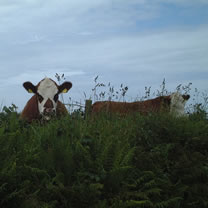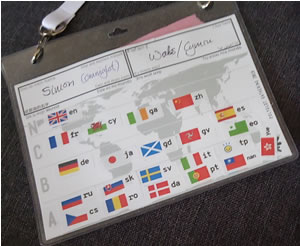
Yesterday I learnt the Russian word for beef, говядина [ɡɐˈvʲædʲɪnə], and the promotely forgot it. So I thought I’d investigate its etymology to help me remember it.
говядина comes from говядо [ɡɐˈvʲadə] and old word for cattle. This comes from the Proto-Slavic *govędo (head of cattle, bull, ox), from the Proto-Indo-European *gʷew-n̥d-, from *gʷṓws (cattle) [source].
The usual Russian word for cow is корова [source], which comes from the Proto-Slavic *kőrva (cow), from the Proto-Indo-European *ḱerh₂- (horn) [source].
*gʷṓws is also the root of:
- gak = boar (Albanian)
- govs = cattle, cow (Latvian)
- говядо = beef (Ukrainian)
- говедо = cattle (Bulgarian, Macedonian & Serbian)
- govedo = cattle (Croatian & Slovenian)
- hovado = brute (Czech & Slovak)
- gowjedo = cow (Lower Sorbian)
- *kūz = cow (Proto-Germanic)
- Kuh = cow (German)
- koe = cow (Dutch)
- ku = cow (Norwegian)
- ko = cow (Swedish, Danish, North Frisian)
- coo, kye = cow (Scots)
- βοῦς = cow (Ancient Greek)
- bōs = cow, bull, ox (Latin)
- bou = ox (Catalan)
- bue = ox, beef (Italian)
- bife = steak (Portuguese)
- bou= ox, idiot (Romanian)
- buey= ox. steer (Spanish)
- bœuf = cow, ox, beef, jam session (French)
- *bāus = cow (Proto-Celtic)
- *bōws = ox (Proto-Celtic)
- bu, buw = cow, bullock, head of cattle (Middle Welsh)
- buwch = cow (Welsh)
- bugh = cow (Cornish)
- bu, buoc’h = cow (Breton)
- bó = cow (Irish)
- booa = cow (Manx)
- bò = cow (Scottish Gaelic)
The English words beef and bovine come ultimately from the same root. Beef comes from the Middle English beef, bef, beof, from the Anglo-Norman beof, from the Old French buef, boef (ox). from Latin bōs (“ox”)
The Proto-Indo-European word *gʷowkólos, from *gʷṓws (cow) & *kʷel- (to revolve, move around, sojourn) gives us the following words in the Celtic languages [Source].
- *boukolyos = herdsman (Proto-Celtic)
- *bʉgöl = herdsman (Proto-Brythonic
- bugail = shepherd, pastor (Welsh)
- bugel = child, shepherd (Cornish)
- bugel = child (Breton)
- búachaill = cowherd (Old Irish)
- buachaill = boy, herdsman, servant, boyfriend (Irish)
- bochilley = shepherd, herdsman (Manx)
- buachaill, buachaille = cowherd, herdsman, shepherd, youth (Scottish Gaelic)

